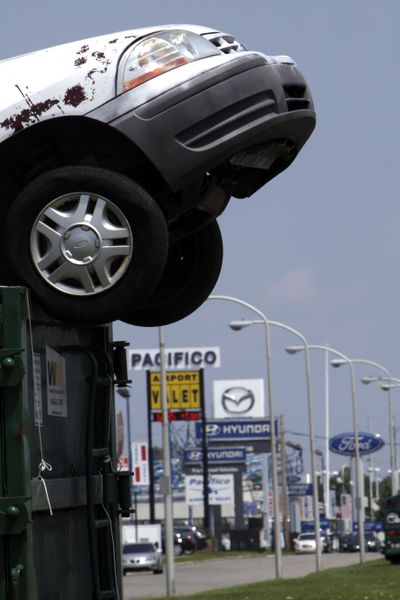Clunkers boost industry
July auto sales strongest in nearly a year

DETROIT – The government’s “cash for clunkers” program drew car and truck buyers back to American showrooms last month, making July the best month for auto sales in nearly a year and offering powerful evidence that the rebates were working as senators debate whether to continue them.
In fact, some automakers, dealers and government officials declared an end to the industry slump that nearly claimed the lives of General Motors and Chrysler.
“We certainly expect that we’ve seen the worst of it,” said Dave Zuchowski, Hyundai Motor Co.’s vice president of U.S. sales, whose sales rose 12 percent over July of last year, the second-best in the industry, behind only Suzuki.
“We’re not saying it’s going to be a high bounce back. We think it will be good, solid, steady growth.”
Even though the overall U.S. market fell 12 percent when compared with July of last year, gleeful automakers reported vastly better sales than in the dismal first half of 2009.
“I think probably this is the greatest one-week energy conservation program that may have come out of Washington or anywhere else,” said George Pipas, Ford’s top sales analyst.
Without the clunkers program, July sales probably would have been about the same as June, Pipas said.
Automakers and the Obama administration said the clunkers program did everything it was designed to do – replace inefficient sport utility vehicles with more efficient cars, boost auto sales and help lead the economy out of recession.
Gas-guzzling vehicles from the 1990s were stacked up on nearly every new car lot in America. As of Saturday, the government reported that 83 percent of the trade-ins under the clunker program were trucks, and 60 percent of the vehicles purchased were cars.
July was the best sales month since August 2008, when the industry sold more than 1.2 million vehicles before the financial meltdown began.
Still, the sudden spike in sales depleted dealer stocks of nearly every major automaker, leading many observers to predict that prices will almost certainly climb later this year.
The Ford Focus, which gets 35 mpg on the highway, was the No. 1 purchase of those trading in clunkers.
Some economists said the rise in auto sales shows that consumers will spend money when they see bargains. Yet they warned that the clunker program’s success hardly signals the beginning of a consumer spending recovery.
“It tells you that shoppers remain focused on promotions, but it doesn’t mean that shoppers are ready to spend in a more carefree manner,” said Frank Badillo, senior economist at consulting group TNS Retail Forward. Faced with mounting layoffs and tight credit, consumers remain very tenuous about opening their wallets, he said.
Still, July auto sales rose to 11.2 million when converted to an annual rate. That’s the first month this year that sales rose above the depressed 10 million level. As recently as 2007, car and light truck sales topped 16 million vehicles, but a drop in consumer confidence sent sales plunging late last year.
Ford Motor Co., which has steadily been gaining sales since GM and Chrysler took government aid and went through bankruptcy proceedings, reported a year-over-year sales increase, up 2.4 percent for the first year-over-year sales jump since November of 2007.
Troubled Chrysler posted a smaller year-over-year sales drop compared with recent months, announcing sales fell 9.4 percent.
GM reported a 19 percent decline, far less than in past months. Toyota Motor Co., where sales have taken a beating in the downturn, also fared better than earlier in the year with an 11 percent drop.
Honda Motor Co. reported a 17 percent sales drop last month, largely because it had a strong July in 2008. Nissan Motor Co. sales were down 25 percent.
Bob Carter, Toyota group vice president in the U.S., said the automaker sold more than 30,000 vehicles through the clunker program, around 17 percent of its sales.
“For us, this really confirms that there’s an appetite out there for fuel-efficient vehicles.”